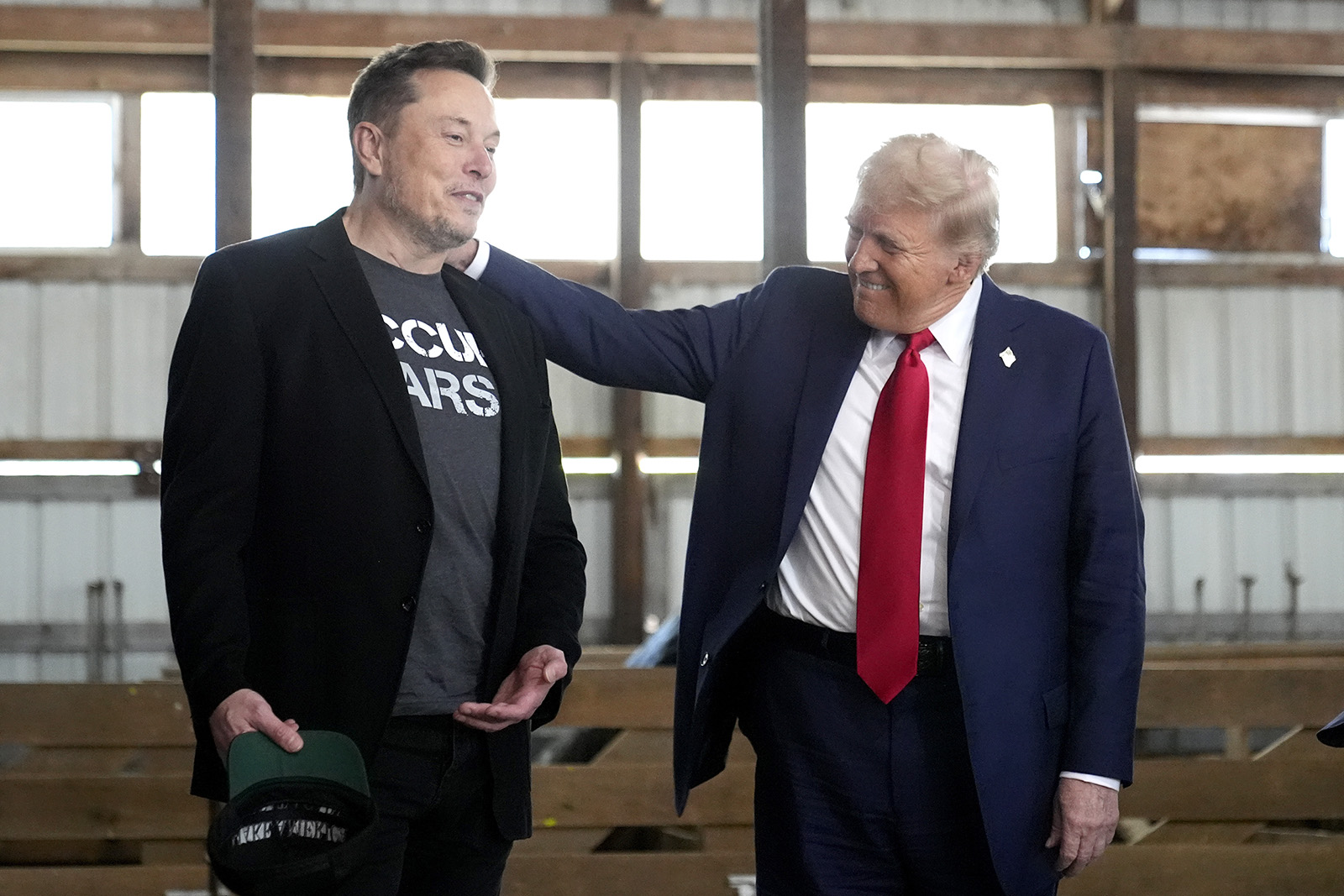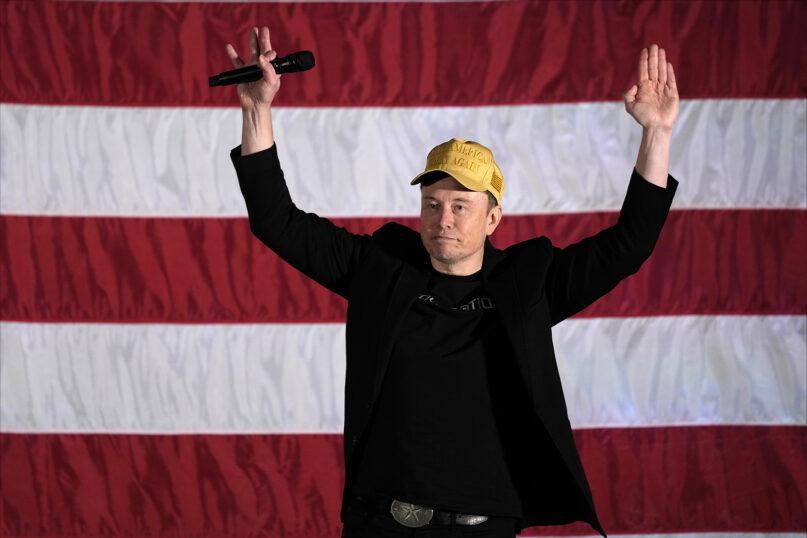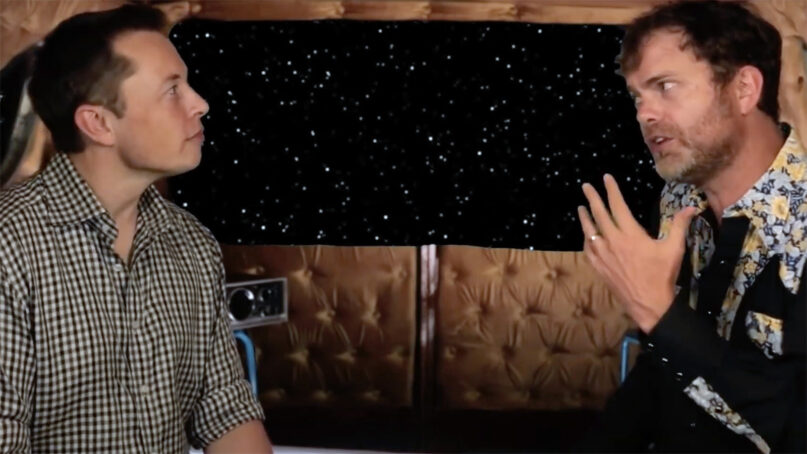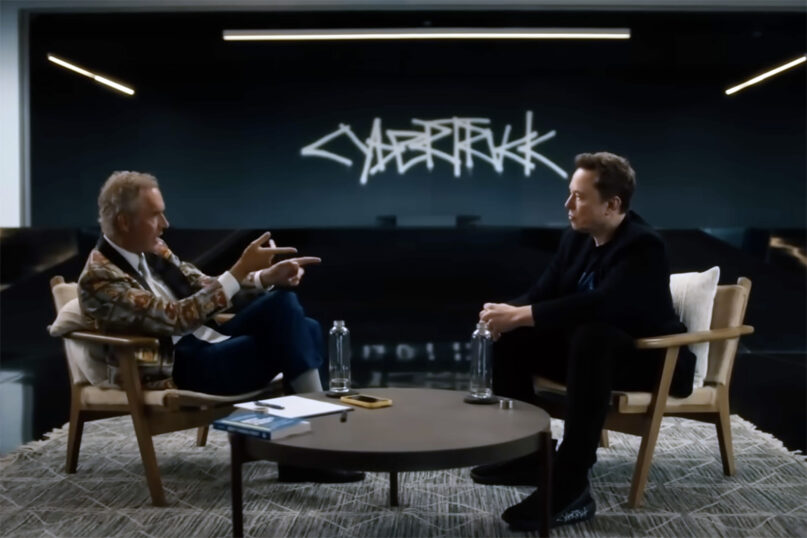
(RNS) — In the waning days of October, several hundred people gathered at the Life Center, a megachurch in Harrisburg, Pennsylvania, for a town hall organized by the Trump campaign. Attendees chatted excitedly as they filed into the church’s cavernous sanctuary.
But when the event began, the speaker who strutted onstage wasn’t former President Donald Trump, or one of his evangelical Christian promoters. Instead, it was Elon Musk, the billionaire owner of SpaceX rocket company, Tesla electric cars and the social media platform once known as Twitter.
Musk, the richest man in the world, has long approached religion with suspicion, and some in the audience were skeptical: One asked what was “keeping” him from believing in God.
“I believe in the teachings of Christ,” replied Musk, whose jacket was adorned with a NASA logo and a mission patch of one of his rocket projects. “I believe in the Christian principles: Love thy neighbor, turn the other cheek — which is very important to have forgiveness. Because if you don’t have forgiveness, then you have an endless cycle of retribution.”
Musk then expounded, giving an unusual take on “turn the other cheek,” arguing that Christ’s edict should only apply if you are already “strong” and not if you are weak. “If you’re facing a sort of a predatory threat, and that threat is stronger than you and that threat doesn’t believe in Christian values, then you will just get, you know, executed,” he said, adding he does not believe the idea is prevalent “in the Middle East.”
The exchange signaled a new stage in Musk’s shift from insisting science and religion cannot coexist to describing himself as a “cultural Christian.” Strange as the metamorphosis may seem, scholars and experts on the nonreligious say it is part of a broader trend among secular thought leaders and Big Tech entrepreneurs. Once seen as a bastion of liberalism, Silicon Valley leaders have increasingly echoed ideas from conservative Christianity on topics from family size to transgender rights. At times, their ideas have seemed to overtake traditional faith as a guiding force for conservatives.

Elon Musk speaks as part of a campaign town hall in support of Republican presidential nominee former President Donald Trump in Folsom, Pa., Thursday, Oct. 17, 2024. (AP Photo/Matt Rourke)
Since the election, Musk, who once criticized Trump’s character, has become a regular at the president-elect’s Mar-a-Lago resort and will co-lead a nongovernmental advisory group tasked with cutting government spending. Some critics argue his relationship with Trump is one of convenience, given that Musk’s businesses stand to benefit from a sympathetic administration.
But scholars on the nonreligious argue that his rapprochement with Christianity goes deeper. Greg Epstein, a humanist chaplain at Harvard University and the Massachusetts Institute of Technology, sees Musk’s pivot as “the least surprising thing ever.”
“He’s the prophet-in-chief of this new wave of highly religious technology that is a dominant force in the current Republican coalition,” Epstein said. “I would say that traditional Christian preachers are still a pillar, of course, of (Trump’s) administration and what it stands for, but they’ve at least been joined, if not superseded, by a different style of preacher.”
Epstein argues in a new book, “Tech Agnostic: How Technology Became the World’s Most Powerful Religion, and Why It Desperately Needs a Reformation,” that “the tech itself has become the object of worship” in Silicon Valley, particularly artificial intelligence, venerated in some minds for its potential to either destroy the human race or rid it of all its ills.
Musk has come to be a “kind of papal figure” among tech moguls, Epstein said. Though he has readily invested in AI, Musk has voiced concerns about its potentially cataclysmic dangers. Musk is also given to apocalyptic visions of ferrying humans to Mars, avoiding our “extinction” by being “bi-planetary.”
Apocalypse is also a prevailing concept in Christianity, and increasingly, our secular politics, according to Whitney Phillips, an assistant professor of media studies at the University of Oregon School of Journalism and Communication. In her new book, “The Shadow Gospel: How Anti-liberal Demonology Possessed U.S. Religion, Media, and Politics,” Phillips and co-author Mark Brockway describe evangelicals’ depictions of a cosmic battle between good and evil, the latter personified by “the liberal devil.”
Today’s politics, Phillips said, furnish “an apocalypse that you can take a bite out of now, because the liberal devil is already here.”
In Musk’s version, said Phillips, evil is “wokeness” or the “woke mind virus,” which the billionaire associates with liberal identity politics he insists is forwarded by The New York Times, National Public Radio, higher education, art and video games and X competitor Bluesky, among other targets. Wokeness, according to Musk, is “absolutely the religion that occupies the space previously held by Christianity.”
Musk’s political “end times” vision was hard to imagine back in 2013, when he climbed into a 1970s-era Volkswagen van to record a podcast with actor Rainn Wilson, who played Dwight Schrute in “The Office.” Wilson, a Baha’i, asked a series of religion-related questions, pressing the tycoon on whether he had a “spiritual life.”
“I’m less convinced that there’s, say, some superconsciousness watching over our every movement and kind of evaluating it against some criteria, and deciding whether we’re going to go to one place or another when we die,” Musk said. “I think that’s unlikely.”
Can science and religion coexist?, Wilson asked. “Probably not,” Musk said. Do you pray? “I don’t. I didn’t even pray when I almost died of malaria.”

Elon Musk joins Rainn Wilson on a podcast in 2013. (Video screen grab)
Eventually, Musk explained that he draws his philosophy from Douglas Adams’ comedic science fiction novel “The Hitchhiker’s Guide to the Galaxy,” in which the meaning of life comes not from discerning answers, Musk said, but from finding the “right question.”
Eight years later he sat for another podcast interview, this time with The Babylon Bee, a satirical conservative Christian website. Asked what book he would add to the Bible, Musk named Adams’ novel, but noted he was raised Anglican and attended Hebrew day school as a child. Things took an evangelical turn near the end of the interview, when the co-hosts asked Musk to accept Jesus.
As soft piano music played in the background, Musk expressed respect for Jesus’ teachings and referred to Einstein, saying, “I believe in the God of Spinoza, but hey, if Jesus is saving people, I won’t stand in his way.”
“I think he just said yes,” a co-host replied. Another joked, “We got him.”
His connection to the Bee proved pivotal. In 2022, the website’s Twitter account was suspended after its publication of a story widely condemned as anti-trans. According to documents filed in a resulting lawsuit, Musk, who has referred to his transgender daughter as having been “killed by the woke mind virus,” exchanged outraged texts with his ex-wife Talulah Jane Riley after news of the Twitter suspension broke. Musk wrote, “Maybe buy it and change it to properly support free speech.”
By October, he owned the platform. Three weeks after he took over, the Bee’s account was reinstated.

Jordan Peterson, left, interviews Elon Musk. (Video screen grab)
Then, in a July interview with Jordan Peterson, a Canadian psychologist with a large male following, Peterson, wearing a blazer covered in Christian iconography, asked Musk, “In what sense, then, are you not religious?”
“I would say that I’m probably a cultural Christian,” replied Musk. He also later agreed with Peterson, who has both identified as a Christian and called God “the ultimate fictional character,” that he preferred societies premised on “Christian axiomatic assumptions.”
Musk, Epstein said, may feel out of sync with his onetime nonreligious community, which has not taken the same rightward turn as he has. Epstein pointed to exit polls indicating religiously unaffiliated voters were one of the only major groups that trended more liberal rather than more conservative in the November election.
“For Elon Musk or somebody like him, cultural and secularized Christianities can be a source of social power or social affirmation of his goodness and greatness, when other, more traditionally secular humanist atheist communities and groups might reject his claim or desire to be seen as a kind of messianic figure,” he said.
Epstein said Musk likely finds common cause for his views on transgender rights in corners of Christianity he otherwise may not agree with theologically. Conservative Christians may also support Musk’s embrace of “pronatalism” — his belief that people should have more children in order to stave off population collapse. (“I’m super pro-baby,” Musk, who has fathered 12 children, told the crowd in Harrisburg.)
Conservative Christians, in turn, have increasingly embraced Musk as a fellow political believer if not a professed follower of Jesus. The Rev. Franklin Graham, son of evangelist Billy Graham, has repeatedly praised Musk on X, and the pastor at Pilgrim Hill Reformed Fellowship in Tennessee, where Trump’s nominee for defense secretary, Pete Hegseth, attends, said Musk’s removal of “censorships” on X is a “huge blessing.”
At the Trump event at Harrisburg, one audience member asked Musk whether he believed Jesus Christ was “a real person who was crucified and died, and is risen, and God is Jesus.” Musk asked the questioner what he meant by “real person,” and eventually acknowledged he believed Jesus “is real,” but quickly moved on without addressing the man’s theological points.
But Musk’s answer seemed to be enough for the audience, and when it later cheered him after he called liberals “enemies of democracy,” Musk appeared to be more comfortable conflating his form of cultural Christianity, however defined, with culture war.
But, of course, producing this journalism carries a high cost, to support the reporters, editors, columnists, and the behind-the-scenes staff that keep this site up and running. That's why we ask that if you can, you consider becoming one of our donors. Any amount helps, and because we're a nonprofit, all of it goes to support our mission: To produce thoughtful, factual coverage of religion that helps you better understand the world. Thank you for reading and supporting RNS.
